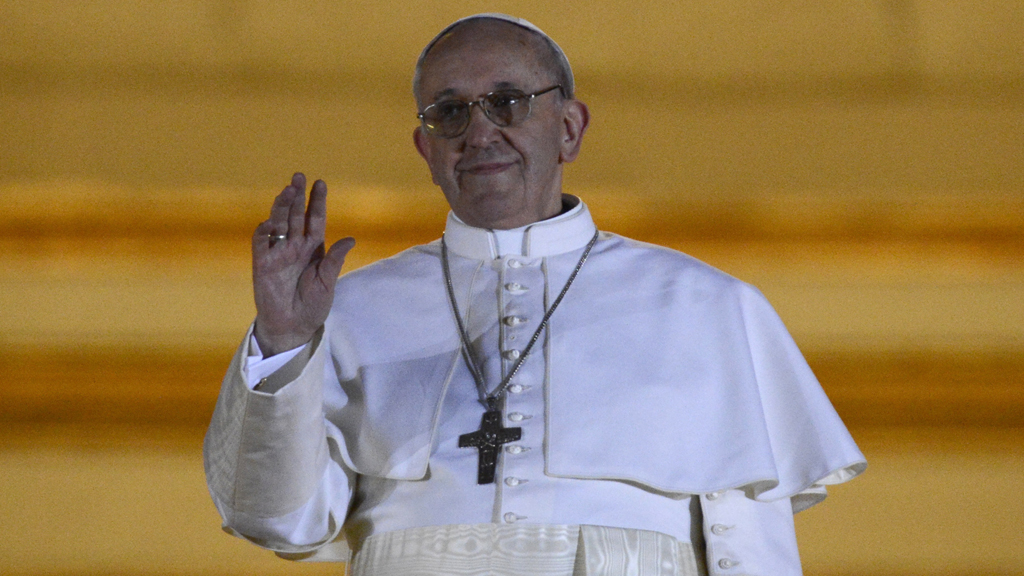Argentina’s Jorge Mario Bergoglio elected new Pope
Jorge Mario Bergoglio is chosen as Latin America’s first pontiff and will be known as Pope Francis I.
The current Archbishop of Buenos Aires, who is 76, was a surprise choice and is also the first Pope from outside Europe in more than a millennium.
Cardinal Cormac Murphy O’Connor, the Archbishop Emeritus of Westminster who was too old to vote under the rules of the church, told Channel 4 News that while “many will say it’s a surprise choice, for me it’s an inspired choice”.
He added that Pope Francis was a “humble, gentle and spiritual man” who would be a blessing” to the church.
Pope Francis is known for his compassion towards the poor, and has taught the importance of respecting people who are gay. But he has also strongly opposed same-sex marriage in Argentina, and has said that gay adoption is a form of discrimination against children.
Pope Francis is in favour of contraception to prevent disease. Appearing before the crowds in Rome, he waved to the people below him in St Peter’s Square and said the cardinals had had to look to “the end of the earth” to find a successor to Benedict XVI.
The news that a new Pope had been chosen was confirmed by white smoke pouring out of a chimney on top of the Vatican and the bells of St Peter’s pealing out.

Pope Francis’ name was announced by French cardinal Jean-Louis Tauran from a balcony of St Peter’s Basilica.
The assumption had been that the new Pope would be relatively young, but he is the oldest of most of the possible candidates and was barely mentioned as a serious contender before the conclave, although he reportedly finished second in the 2005 conclave that elected Benedict.
He is also the first Jesuit to become Pope.
The election, on the first full day of voting by the 115 cardinals, came more quickly than many had expected after no obvious frontrunner had emerged following the surprise abdication of Benedict last month.
Who is the new Pope?
Jorge Mario Begoglio was born in 1936, one of five children of an Italian railway worker and his wife.
It could be argued that his Italian roots will enamour him to those in the Vatican City who wanted the papacy "brought home", whilst at the same time providing the Church with its first Latin American leader, appealing to the continent's 283m Catholics.
The Archbishop of Buenos Aires is seen as staunchly Orthodox on matters of sexual morality, abortion, contraception and same-sex marriage.
On homosexuality he has preached that the rights of gay people should be respected, but at the same time he has strongly opposed same-sex marriage legislation in Argentina.
When the Argentine government tried to introduce legislation to allow same-sex marriage in 2010, Bergoglio wrote to the monastries of Buenos Aires saying: "Let's not be naive, we're not talking about a simple political battle; it is a destructive pretension against the plan of God.
"We are not talking about a mere bill, but rather a machination of the Father of Lies that seeks to confuse and deceive the children of God."
He also said that adoption by gay couples is a form of discrimination against children - for which he received a public telling-off from Argentine president Cristina Fernández de Kirchner who said his comments were "reminiscent of Medieval times".
A crowd in St. Peter’s Square started cheering and applauding as the first puffs of smoke emerged, braving persistent rain and chill winds to get a glimpse of history.
Nuntio vobis gaudium magnum HABEMUS PAPAM Francesco I
— VaticanCommunication (@PCCS_VA) March 13, 2013
Pope Francis, the 266th pontiff in the church’s 2,000-year history. faces a daunting array of problems, including sex abuse scandals, infighting within the Vatican bureaucracy and the growing spread of secularism.
Benedict XVI abdicated unexpectedly last month, saying he was no longer strong enough to confront the challenges confronting the church, the world’s largest organisation with an estimated 1.2 billion followers.
Cardinals held an initial, inconclusive vote on Tuesday evening and a further two followed on Wednesday morning. They returned to the Sistine Chapel at 4.00 pm (GMT) and at 7.05 pm the white smoke emerged.